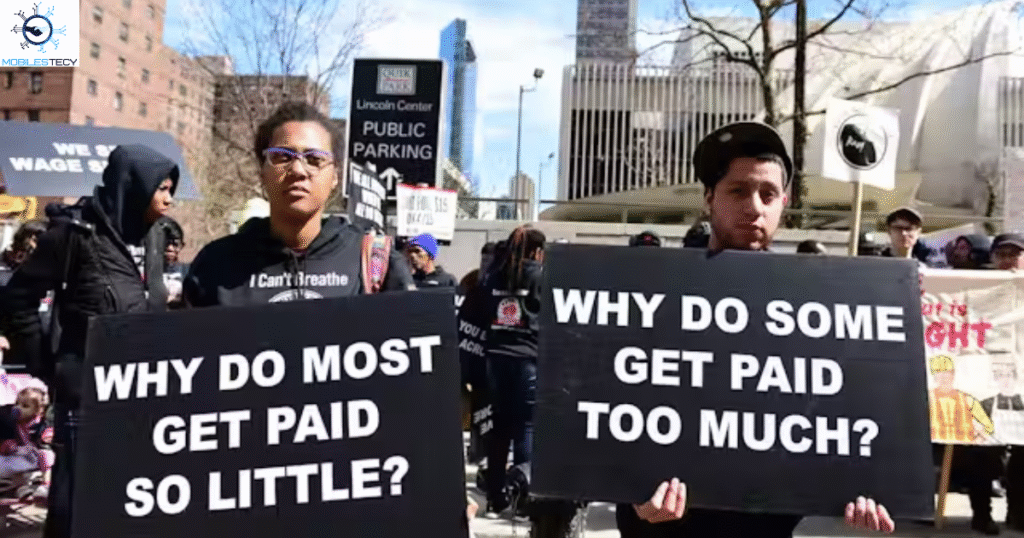Minimum wage remains a deeply debated topic across the United States. In Mobile, Alabama, it significantly impacts workers in low-paying industries. With no state-set minimum, the federal rate of $7.25 applies. This amount often fails to meet workers’ basic living needs locally. Economic pressures continue growing while wages have stayed mostly the same.
Mobile’s economy includes industries like tourism, retail, and manufacturing sectors. Many employees in these fields earn close to minimum wage levels. Low wages contribute to rising poverty and reliance on public assistance programs. Despite steady work, many families still struggle to afford basic necessities. Living in Mobile today means stretching dollars further than ever before.
Efforts to raise wages locally face opposition at the state level. In 2016, Alabama banned cities from setting higher minimum wage standards. This law blocked Birmingham’s attempt to raise pay for local workers. As a result, Mobile cannot respond to its own economic challenges. Residents now look to federal solutions for wage justice and reform.
The Reality of Minimum Wage in Mobile, Alabama

Many Mobile residents work full-time but still live in poverty today. Jobs in food service, retail, and cleaning often pay minimum wage. These wages rarely cover housing, food, transportation, and basic health needs. Working families are forced to rely on food stamps and Medicaid programs. The financial strain is constant, with little room to save or grow.
The state of Alabama uses the federal minimum of $7.25 hourly. No local government in Alabama can set its own wage rate. In 2016, lawmakers blocked Birmingham’s attempt to raise its minimum wage. That decision now affects cities like Mobile, despite local economic differences. Residents face high living costs but cannot push for local change.
A living wage in Mobile is double the current legal minimum. MIT’s calculator shows adults need over $15 per hour to survive. For single parents, the needed income rises to $30 or more. The gap between earnings and needs continues widening across working communities. Rising costs make survival difficult for those earning the minimum wage.
Local Economy and Its Dependence on Low-Wage Jobs
Mobile’s economy includes retail, hospitality, and service-related job sectors. These positions often pay close to or exactly minimum wage. Workers fill essential roles yet struggle to maintain financial stability daily. Low wages limit upward mobility and contribute to growing economic stress.
Major employers include shipbuilding, aerospace, and healthcare within city limits. However, not all sectors provide livable wages for their workers. While industries thrive, many employees still face paycheck-to-paycheck realities. Economic growth hasn’t equally benefited Mobile’s low-income working population at all.
- The federal minimum wage of $7.25 still applies in Mobile, Alabama.
- Many Mobile workers earn minimum wage in retail, food, and hospitality.
- A living wage in Mobile is estimated at over $15 hourly.
Cost of Living vs. Earnings in Mobile

Rent prices and utility costs have increased steadily over recent years. Food, gas, and basic necessities now consume most of monthly income. Workers earning $7.25 an hour must often juggle multiple jobs. Many live without savings, vulnerable to any sudden financial emergency.
Public transportation and childcare add to the cost-of-living burden. Minimum wage earners must often sacrifice comfort just to survive. A single missed paycheck can lead to eviction or utility cutoff. These daily pressures impact health, well-being, and long-term economic opportunity.
The Debate Over Raising the Minimum Wage
Advocates for increasing the minimum wage argue that higher pay can stimulate local economies and lift families out of poverty. When low-income workers earn more, they tend to spend within their communities, directly supporting small businesses and neighborhood growth. Improved wages also enhance employee morale, reduce turnover rates, and lead to higher productivity. Additionally, better compensation can decrease reliance on public assistance programs, allowing individuals to live with greater stability and self-sufficiency.
On the other hand, critics caution that raising the minimum wage could have unintended economic consequences. Many small business owners fear that higher payroll costs may force them to reduce staff or cut operating hours. Some also warn that automation could accelerate as companies seek to offset increased labor expenses. Entry-level job opportunities might become more limited, especially for students and first-time workers.
In Mobile, local leaders have prioritized skills training and workforce development as key tools to reduce poverty. Job-readiness programs aim to equip workers with practical experience and pathways to better-paying roles. However, without corresponding wage growth, training alone may not fully close the income divide. Many residents and advocacy organizations continue to advocate for a fairer minimum wage that reflects modern living costs.
Barriers to Raising the Minimum Wage Locally

State law prohibits cities from setting local minimum wage increases. This ban blocks Mobile from addressing its specific economic challenges. Local officials have few tools for wage reform or direct relief. Without autonomy, communities cannot act on behalf of their workers.
Efforts in Birmingham were overturned by the state in early 2016. Since then, other cities have faced similar legislative roadblocks statewide. Even strong public support hasn’t led to meaningful legal change. Cities remain powerless to raise wages even when clearly justified.
- Rising rent, food, and gas costs strain minimum wage workers constantly.
- Full-time minimum wage work earns about $15,000 yearly before any taxes.
- Workers frequently rely on SNAP, Medicaid, or public housing assistance programs.
Future Outlook for Wage Reform in Alabama
Many advocates now focus on federal solutions to wage stagnation. Raising the national minimum wage could help all Alabama workers. Legislation like the Raise the Wage Act gains support each year. Still, progress is slow and highly dependent on political shifts.
Grassroots movements in Mobile continue pushing for justice and fair wages. Local nonprofits, churches, and workers’ unions lead community-wide awareness campaigns. These efforts aim to educate, organize, and influence state-level policy. Lasting change may come only through sustained public and political pressure.
- Efforts to raise local wages were blocked by the state legislature.
- Small business owners worry that higher wages might increase labor costs.
- Advocates argue higher wages boost spending and reduce public assistance needs.
- Grassroots groups in Mobile continue pushing for fair wage legislation change.
- Federal wage reform may be Mobile’s best hope for wage increase.
Faq’s
What is the current minimum wage in Mobile, Alabama today?
The minimum wage in Mobile remains $7.25 per hour federally. Alabama has no separate state wage law to increase that rate.
Can Mobile raise its minimum wage independently from the state?
No, state law blocks cities from setting their own wage rates. Mobile must follow the federal minimum unless state law is changed.
How much is considered a living wage in Mobile currently?
A single adult needs over $15 per hour to survive. For parents with children, the amount needed is even higher.
Why hasn’t Alabama increased its minimum wage like other states?
Alabama leaders prioritize business interests and oppose mandated wage increases. The state maintains low-regulation policies and limits local wage control.
Who is most affected by the low minimum wage in Mobile?
Service, retail, and food workers earning hourly wages are most affected. Many are single parents, students, or older adults without other income.
Conclusion
The minimum wage in Mobile, Alabama remains at federal levels today. Workers earning $7.25 face growing expenses and shrinking financial security daily. Without local control, the city cannot adjust to economic challenges independently. This leaves many residents trapped in poverty despite working full-time jobs. A solution is needed to support Mobile’s most vulnerable working populations.
Raising the minimum wage could reduce poverty and boost local economies. It would allow workers to meet basic needs without government assistance. More income in households means more spending in local Mobile businesses. However, opposition remains strong from state leaders and some business groups. Balancing growth and fairness is central to the ongoing wage debate.
For meaningful change, state or federal action is likely required soon. Grassroots groups and advocates must continue pressing lawmakers for wage reform. Mobile’s future depends on creating fair, sustainable jobs for its people. The minimum wage issue reflects deeper challenges in equity and opportunity. Empowering workers is essential to building a stronger, more just community.
Read more latest Articles on Mobilestecy.com








